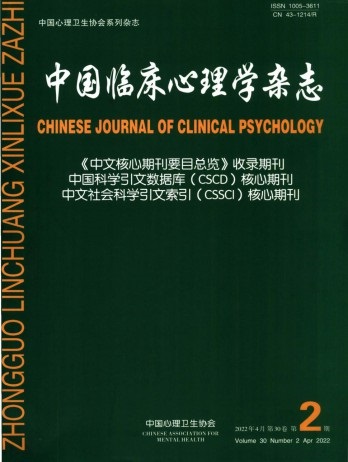The Chinese Marital Quality Inventory: Development, Reliability and Validity
引用次数: 9
Abstract
Objective:To develop Chinese Marital Quality Inventory (CMQI) and examine it's reliability and validity.Methods:A 90-items, self-report measure of marital quality was developed based definition of marital quality and Jackson's fundamental principles of scale construction. The test-retest reliability, split-half reliability, internal consistency reliability, construct validity, and empirical validity were examined in the general sample of 1303 subjects, retest sample of 52 subjects, and validity sample of 95 subjects, aged from 6 to 91 years. Results: The stability coefficients, split-half reliability, Cronbach's α coefficients were 0.852,0.899, and 0.925 for total score, 0.672~0.856,0.477~0.698 and 0.462~0.645 for 10 dimensions. The CMQI was significantly correlated with ENRICH. The correlations between dimensions ranged from 0.502 to 0.745.Factor loadings and correlations between dimensions and total score were above 0.77. The dimensional scores and total score were significantly correlated with some score of the SCL-90 and MMPI. The marital quality of separation and divorcee was worse than that of subjects in marriage. Conclusion: The stability, internal consistency, and validity of the CMQI are good and meet with psychometric standard.中国婚姻质量量表:发展、信度与效度
目的:编制中国婚姻质量量表(CMQI),并对其信效度进行检验。方法:基于对婚姻质量的定义和Jackson量表构建的基本原则,编制了一套90项的婚姻质量自述量表。对年龄6 ~ 91岁的一般样本1303人、重测样本52人、效度样本95人进行测试-重测信度、分半信度、内部一致性信度、结构效度和经验效度的检验。结果:总分的稳定性系数、分半信度和Cronbach’s α系数分别为0.852、0.899和0.925,10个维度的稳定性系数分别为0.672~0.856、0.477~0.698和0.462~0.645。CMQI与ENRICH呈显著相关。各维度之间的相关系数为0.502 ~ 0.745。因子负荷及各维度与总分的相关系数均在0.77以上。维度得分和总分与SCL-90和MMPI的部分得分显著相关。分居离异者的婚姻质量较婚姻主体差。结论:CMQI的稳定性、内在一致性和效度较好,符合心理测量标准。
本文章由计算机程序翻译,如有差异,请以英文原文为准。
求助全文
约1分钟内获得全文
求助全文
来源期刊
自引率
0.00%
发文量
5595
期刊介绍:
Founded in 1993, Chinese Journal of Clinical Psychology is under the supervision of the Ministry of Education of China and organized by China Mental Health Association. The journal mainly publishes original research reports on various subdisciplines of clinical psychology in China, as well as reviews reflecting the hot spots and dynamics of clinical psychology research at home and abroad. There are columns on basic and experimental research, psychological testing and assessment, pathological psychology, health psychology, psychotherapy and counseling. The main readers are scientific and technical personnel, postgraduate students, and clinical workers engaged in scientific research and practical activities in clinical psychology, applied psychology, and mental health in universities, research institutes, and key medical and healthcare organizations.

 求助内容:
求助内容: 应助结果提醒方式:
应助结果提醒方式:


